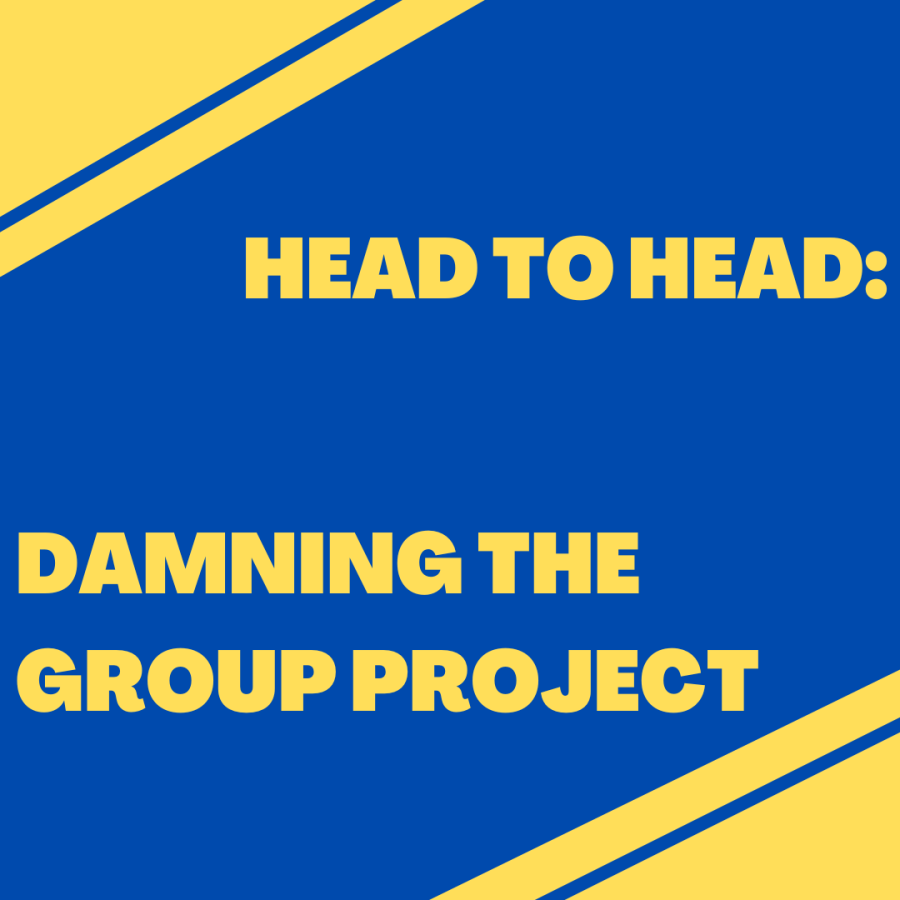Head-to-Head: damning the group project
Managing Editor, Laken Kincaid, damns the concept of the group project
Sep 30, 2022
This column is part of a “Head-to-Head” series. Read the counterargument by Eric Fogle.
There are two subjects I hate in academia: the oxford comma and group projects. If I had to choose a greater evil, I may give to the latter because at least someone is a fan of that piece of god forsaken punctuation. Honestly, for group projects, I do not think there is a single soul, except for The Carroll News Opinion Editor Eric Fogle, who supports it, let alone has a laptop sticker calling themselves an enthusiast of it. Undoubtedly, I am a group project detractor.
In my opinion, building teamwork isn’t worth the risk of a heavier workload when you are left to do everything yourself. Albeit, making it lighter by placing your grades in the hands of others is just as terrifying. While some may think you will develop soft skills like communication and patience, you will instead feel a looming sense of worry that will not go away until you get that dreaded Canvas grade announcement. To say the least, this column is in detest of the group project. My stance: they are one of the worst and unnecessary pains a student can have.
I know this may very well paint me as someone who is selfish, untrustworthy or even drastically introverted. My previous instructors will probably look at this piece and either roll their eyes or feel a bit of shock. All three of those aforementioned adjectives are a pretty stark contrast to how I am with my social life and how I present outwardly. I love to be around people and form close relationships with them; I often willingly give my time and resources to those I am close with. However, with my academics, I am the exact opposite and I know many people resonate with that.
Like many collegiates, I put too much pressure on myself to perform well in school. This means I tend to perceive my self worth through my GPA; call it “burnt out gifted kid syndrome” if you will. While this thought pattern has kept me on my toes with assignments and helped me achieve the record I currently have, I can recognize that this thought pattern is still a little bit unhealthy. Regardless, I am in no way alone with thinking like this and group projects only exacerbate that anxiety for everyone.
Rewards like grades are supposed to be a reflection of your own work, anything else either feels like you cheated the system or the system cheated you.
What professors do not realize is that group projects often become a game of strategy for everyone involved. I found that there are two groups of people for this: the overachievers and the underachievers.
For overachievers like myself, we always try to find a way to get the highest grade possible. This sometimes includes imparting lavish ideas onto the group over others (especially if we believe, or worse, know we’re right). Personally, I am not obvious with this persuasion to avoid conflict within the group, nevertheless it is still a recurring pattern I will own up to. Oftentimes, multiple overachievers in the group will try to take control because they fear a bad report as much as everyone else and are only confident in their own abilities. Some may try to disperse tasks but they always give the most important responsibilities to themselves or someone they entirely trust as 100% competent with the subject material (which, for me, is very hard to find). We can not handle the idea of someone else causing us to fail.
For the other sect, the underachievers, their approach is to find a way to do as little as possible while still receiving full credit. They know that the overachievers will not let anything, even a lack of their own work, stand between them and an A. Therefore, they let all of the overachievers in their group bicker while their carelessness goes unnoticed.
You can choose to not be a part of either of these groups, but either your willpower or lack thereof will eventually have you falling into one of the categories. In the end, you will embody either the action or inaction of the project. One comes with countless debates about logistics while the other watches as their reputation receives a blow for laziness.
Unless there is a perfect balance between these two groups, which there never is, group projects will always cause more stress than they are worth. While some group projects may present as entirely cohesive on the outside, there is always underlying angst within each paired assignment. Group projects do not test teamwork or cooperation, they test how willing you are to compromise your own personality for the sake of a smooth operation. This rarely goes in tandem for those who worry about their grades as much as I do; if anything, it only heightens the terror associated with failure. After all, what is more scary than accepting defeat for a war you had no part in?
Group projects just seem like Freudian social experiments to me and I will never understand them. I do not gain any emotional intelligence from them and any “new perspectives” I might gain could have come from a peer review or just an honest conversation. While class discussions are pivotal for insight, creating tiny groups destined to either argue or falter is not.
Perhaps this article just demonstrates my own pitfalls. There are definitely arguments for the group project but they all fall flat on the ears of those who hold their academics close to their chest and protect them like their own livelihood. In all fairness, I (and probably many of those like me) will never see group projects as worth the stomach churning concern they cause me. Personally, they will always just be another avenue to compromise my own feelings and ideas for the sake of a winning report card.













